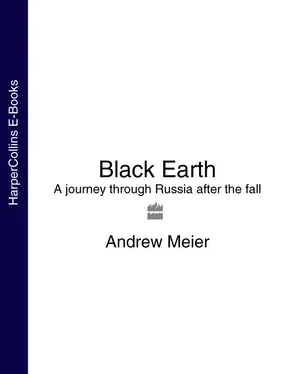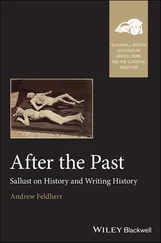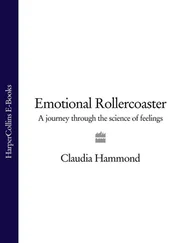One morning I saw a young couple, noses pressed to the glass, standing transfixed by the cardboard city. Like so many of the pilgrims who came to see this model of Moscow, they were eager and hopeful witnesses to the birth of the new Siti. They tried to locate their apartment in the model city, but it spun too fast. They spent another moment, then moved on.
“Think it’ll ever be built?” the elfin girl, her long hair braided low below her waist, asked her companion.
“No,” he replied. “Of course not.”
IN MOSCOW I WAS AFRAID every day. Not that I would be attacked. I had been, but not harmed. No, my fear was derived from bad news, the flow of death, violent and early death, that courses through each day in Moscow. As luck would have it, we lived a floor beneath a celebrity, a would-be banker who helped run a notorious pyramid scheme that bankrupted thousands when it crashed in the first post-Soviet years. He was well protected. In the morning, he posted flint-chinned bodyguards with short-stock Kalashnikovs buttoned inside their suit coats at his door and on every landing of our stairwell. At night, he didn’t let us sleep. Big footsteps pounded overhead at all hours. One of his guards, it seemed, stood post all night. In the morning I would be sure to cough, sniffle, or shuffle loudly to let the guards know I was coming their way. I bade them good morning as they rebuttoned their jackets.
Paul Tatum, a onetime Republican fund raiser from Oklahoma and a well-known man about Moscow, was the most famous foreigner killed. Pravda , in 1990, had announced his arrival with creamy praise. Tatum, Pravda said, “has a dream, an American dream … He dreams of the day when a tiny American oasis will grow in the center of the Soviet capital.” The “oasis” was the Radisson Slavyanskaya, Russia’s first deluxe Western-style hotel and business complex. Coowned with the Moscow city government, it grew into a bustling hotel that hosted visiting American presidents. “My baby” Tatum liked to call it. But as later was the case in so many of the so-called joint ventures, before long the natives made moves to muscle him out – at times literally. A long, nasty fight ensued.
Tatum was killed on Halloween night in 1996, the week I started at Time . I was working in the bureau on a Sunday evening when a few blocks away Tatum, as he entered an underground walkway, fell to the ground in a hail of bullets. Eleven of the twenty shots hit him. I had often seen him around town. The last time had been on the summer night earlier that year when Yeltsin won his improbable reelection. Tatum made the rounds at election headquarters. “I’m gonna win this war,” he vowed to all who would listen. As the TV correspondents reported Yeltsin’s “miraculous comeback” and “the end, perhaps forever, of the Communist threat to Russia’s young Democracy,” Tatum was his usual cocksure self “United we stand,” he declared, “and divided we fall.”
Tatum was by no means alone. Each day I scanned the local wires: an English engineer found burned to death in his own apartment; an American television producer, a Californian in his thirties who came to Moscow to do good, stabbed to death; a young Canadian diplomat discovered dead in his living room (victim of a slipped mickey, the reports said); a German chef beaten to death on a central street, his face “torn.” There were many more, but those who succumbed to Moscow’s violence were rarely foreigners. We were invisible. Compared to the newly moneyed local elite, we were poor.
“Not likely these days,” said my friend Lyona, the son of a Soviet general lavishly decorated for his service to military intelligence, when I told him how Mia and I had been robbed in Moscow once before, in 1991. That had been back in the old Soviet days, when foreigners were few in number and far richer than their neighbors. In one hour, as we shopped at a local market, our place had been stripped. The thieves took everything – and tidily hauled it off in our suitcases. They even took the telephone. “No one will touch you now,” Lyona said. It was nothing against foreigners, he said. It was just that Russian thieves now wanted real money.
Now they went after the New Russians. The so-called Noviye Russkie –a deliberate play in Russian on “nouveau riche” – were those who had managed to grab a slice of the spoils and grown preposterously rich overnight. Most Russians, being Old Russians, naturally hated the New Russians. In the jokes that Russians addictively tell each other, they had replaced the Chukchi, a desperately poor native people of the Russian north who had long suffered as the favored butt of Soviet jokes. Lyona was right. The New Russians had become the new target.
I HEARD COUNTLESS TALES of horror from friends and neighbors. But none was more frightening than the one I heard T ***tell. I believed it right away because I believed everything he told me. He was the only Russian I ever met who had survived, flourished even, in the upper reaches of the Soviet Communist Party and the Russian Orthodox Church. His business, at least on the wintry day we met in the center of Moscow just off Pushkin Square, was oil. The church’s oil. Early in the Yeltsin era, the Orthodox Church won the right to export, tax-free, millions of barrels of Russian crude each year. T ***now worked for the trading company the men of the cloth had set up. The work, he said, was pretty much the same as what he did in the old days. “Only now instead of the general secretary, I serve His Holiness.”
T ***was fond of sushi, sweet Georgian wine, and sayings like “Creeds come and go, but I’m still here.” Over lunch he digressed from a discussion of the church’s role in building the market economy to a description of the forgotten world of Mikhail Andreyevich Suslov, Brezhnev’s long-serving ideologist and gray cardinal. Though dead for decades, Suslov remained one of the few old Party bosses who still conjured fury among Russians. My neighbor Valery, a kindly retiree from the Soviet Foreign Trade Ministry, hated him as the symbol of Politburo excess. Valery’s aunt, a nurse who spent her life ministering to the Party elite in the Kremlin hospital, had regaled him with tales of Suslov’s enemas. Each morning he came to the Kremlin hospital for his daily fruit juice. Not to be outdone, his wife demanded fresh trout each week, flown in from Lake Sevan in Armenia. But none of this troubled T ***. His tale concerned Suslov’s grandnephew, a forty-year-old banker named Vladimir Sterlikov. Sterlikov, it was said, once lived in the dacha of Galina Brezhneva, Brezhnev’s daughter, who had a weakness for diamonds, drink, and circus performers. For a time Sterlikov had worked for Pravda . Now he was the deputy head of the Russian Bank for Reconstruction and Development–“until recently,” T ***added with relish.
“It was early one morning out on Rublyovka …,” T ***said, setting the scene. He was careful to call the Rublyovskoye Schosse by its nickname, the Rublyovka. He was letting me know that he too graced Moscow’s most prestigious artery. Clogged morning and night with convoys of Bavarian sedans, the Rublyovka was the gateway to the off-hours realm of the elite. It was the road that bore the city’s richest and mightiest into town from their fortified cottedgi , cozy five-story affairs nestled in the birches just beyond the city limit. Because it led directly to the residences of the mayor of Moscow, the prime minister, the cabinet, and, of course, the president himself, the Rublyovka was also the most heavily guarded road in Russia.
“It was early in the morning,” T ***repeated, pausing between sips of green tea, “when Suslov’s poor grandnephew met his bitter end.”
Читать дальше












